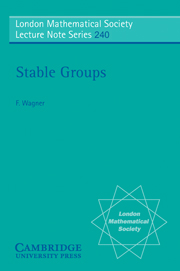2 - Groups & Genericity
Published online by Cambridge University Press: 05 April 2013
Summary
In this chapter we shall develop the second main tool for analysing stable groups, the method of generic types. In section 0 we shall develop the relevant notions for the case of a superstable group before introducing them in full generality in section 1, which culminates in a general existence and definability theorem for stable structures: any semi-group with a certain cancellation condition is contained in a definable group. The next, short, section generalizes the results obtained for groups to transitive group actions. We shall see the first simple applications in section 3, where we look at fields and prove equality of the additive and the multiplicative generic types. Furthermore we shall transfer the definability results to fields.
In section 4 we shall look at generic properties. This is inspired by algebraic group theory: if some equation is satisfied generically in an algebraic group, then it is satisfied by the whole group, as it defines a Zariski closed set of maximal dimension. For stable groups similar questions are mostly open; the only settled cases deal with nilpotency, solubility, and exponent 2 or 3. If the group is soluble-by-finite, then generically finite exponent implies finite exponent, and generically prime exponent implies that the group is nilpotent-by-finite.
The Superstable Case
Before we start with the general theory, we shall illuminate the relevant concepts in the superstable case. Readers familiar with this part of the theory may safely continue with section 1. Throughout this section G will denote a superstable group.
- Type
- Chapter
- Information
- Stable Groups , pp. 107 - 141Publisher: Cambridge University PressPrint publication year: 1997

